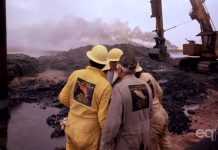When we talk about global debates that hold the power to shape economies and the environment, one cannot ignore the controversy surrounding the potential construction of coal-export terminals in the Northwest. The region finds itself at the epicenter of a powerful dilemma, as detailed in the documentary “COAL”. It is here that the promise of economic recovery clashes head-on with the potential environmental consequences.
The documentary “COAL” presents an in-depth examination of the implications of opening this region to the lucrative markets of what is often deemed the world’s dirtiest fossil fuel. The US economy has been struggling, and some argue that the revenue from coal exports could provide a much-needed boost. The question, however, that “COAL” dares to ask, is: Can the nation truly afford the environmental cost?
Through meticulous reporting and candid interviews, “COAL” delves into the various perspectives on the coal-export debate. It showcases the stark differences between those who stand by the potential economic benefits and those who worry about the environmental impacts of such actions. This well-rounded and detailed analysis highlights that there are, indeed, significant stakes on either side of the debate.
On one hand, coal-export proponents assert that the export terminals could invigorate the local economy, bolstering job growth and industry development. They argue that the prosperity from coal exports could potentially breathe new life into struggling communities and industries, aiding the overall recovery of the US economy.
On the other hand, environmentalists and community members express deep concerns about the potential repercussions of coal exports. The potential harm includes not only the increase in carbon emissions but also the local impacts on air and water quality, public health, and the quality of life for local communities. Moreover, environmentalists fear the risk of setting a precedent that could open the door to further harmful practices in the future.
“COAL” does more than just present the different sides of the debate—it digs deep into the core of the issue. It invites the viewer to consider the potential trade-offs between short-term economic gains and long-term environmental sustainability. With coal being a significant contributor to global carbon emissions, the consequences of furthering its trade and consumption could have lasting global implications, going beyond the immediate regional impacts.
What makes “COAL” a compelling watch is not just its thorough exploration of the issue but also its ability to humanize the debate. It takes the viewer to the heart of the communities at the center of this controversy, introducing us to the individuals whose lives and futures are intertwined with the outcome of this debate.
In conclusion, “COAL” is an eye-opening journey into a pressing issue at the intersection of environmentalism and economics. It lays bare the complexity of a debate that has far-reaching consequences, not just for the Northwest or the United States, but for the global community grappling with the urgent need for sustainable economic solutions. This documentary invites us all to think more deeply about our shared future and the choices we make today.

































